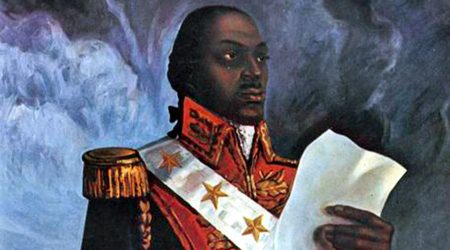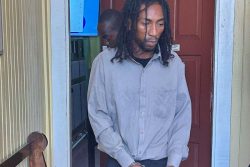To Toussaint L’Ouverture
 TOUSSAINT, the most unhappy man of men!
TOUSSAINT, the most unhappy man of men!
Whether the whistling Rustic tend his plough
Within thy hearing, or thy head be now
Pillowed in some deep dungeon’s earless den;—
O miserable Chieftain! where and when
Wilt thou find patience? Yet die not; do thou
Wear rather in thy bonds a cheerful brow:
Though fallen thyself, never to rise again,
Live, and take comfort. Thou hast left behind
Powers that will work for thee; air, earth, and skies;
There’s not a breathing of the common wind
That will forget thee; thou hast great allies;
Thy friends are exultations, agonies,
And love, and man’s unconquerable mind.
William Wordsworth, 1803
War down a Monkland,
War down a Morant Bay,
War down a Chiggerfoot,
The Queen never know.
War, war, war oh!
War oh! Heavy war oh!
Soldiers from Newcastle
Come down a Monkland
With gun and sword
Fe kill sinner oh!
War, war, war oh! War oh!
Heavy war oh!
Anonymous (1865)
Hipsaw! My deaa! You no do like a me!
You no jig like a-me! yo no twist like a-me!
Hipsaw! My deaa! You no shake like a-me!
You no wind like a me! Go, yondaa!
Hipsaw! My deaa! You no jig like a-me!
Anonymous, (1793)
Take him to the Gulley! Take him to the Gulley!
But bringee back the frock and board.
’- Oh! Massa, massa! Me no deadee yet!’-
Take him to the Gulley! Take him to the Gulley!
Carry him along!’
Anonymous (1797)
Freedom a come O
Talla-lilly-O
So we dig so we hoe
Talla-lilly-O
Slavery a gone o
Talla-lilly-O
So we dig so we hoe
Anonymous (1807)

These poems and excerpts which are contrasting in a number of ways, are all very relevant to themes of liberation, struggle, heroism, rebellion, colonisation, slavery and servitude. They are all post-colonial in their different ways, and are meaningful anthems to revisit in the season of emancipation.
They arise from different traditions and even different historical occasions but all belong to the spirit of emancipation. They are rooted in different countries. One is based in Haiti, one in Trinidad and Tobago and others in Jamaica. The first of August is not the anniversary of emancipation in Haiti as it is in the Anglophone Caribbean, and “August Monday” (the first Monday in August) holds even more significance for Jamaica since it is also independence time – the anniversary of Monday, August 6 (1962).
William Wordsworth’s sonnet “To Toussaint L’Ouverture”, is not so well known, is generally hidden away and receives negligible attention among his poems. Yet it is thematically, historically and philosophically significant to Wordsworth’s poetry and to the romantic poetry of the time it was written. Then, of course, that same historical background is very relevant to the poem’s treatment here in the context of liberation, heroism and slavery.
It is rooted in Haiti because of its obvious reference to Toussaint L’Ouverture, leader of the Haitian Revolution. Because of the success of that rebellion, Haiti has always been a symbol of liberation, struggle and emancipation – a kind of archetypal model for the rest of the Caribbean. The Haitian Revolution was the first successful slave revolt in history, the only one that achieved freedom from slavery and independence – the establishment of a sovereign nation governed by the freed former enslaved Africans. Despite the persistent tragic undercurrents in its history since then, it is hailed by the rest of the region for its post-colonial stature and achievements.
Toussaint, of course, is exemplified as a hero and it is interesting to note that he was regarded in that light even at that time in England at the beginning of the nineteenth century. Note that Wordsworth refers to him as L’Ouverture with the prefix “Le” meaning “the”. Sources give his name as Louverture, but others use “L’Ouverture” which suggests the title which is French for “the liberator” (literally the opener, one who opens the way – from “ouvert” which means “open”) – a name/title which, whether by happenstance or deliberate glorification, is commensurate with how he led the French colony of Saint Domingue to freedom. Wordsworth published the sonnet in 1803.
At that time, the Haitian leader had been betrayed by his own generals and was taken prisoner by Napoleon. It is notable that Wordsworth found him a sufficiently important figure for tragic study and poetic tribute. It shows the impact of the Haitian Revolution and the fight for freedom by formerly enslaved people in a French colony. As a Romantic poet Wordsworth shared a humanitarian revolutionary philosophy and would have been familiar and even sympathetic with the Jacobins of the French Revolution and the philosophy of “Liberte, Fraternite, Egalite”, adopted by Haitian revolutionaries. The anti-slavery struggle would have appealed to him as it did to (pre-)Romantics Blake and Burns.
It is also significant that Wordsworth presents Toussaint as a tragic figure. The poem is elegiac even though written before Toussaint died. It is the human side of the hero that appeals to the poet rather than the militant heroic fight that defeated Napoleon in battle and equally fended off the Spanish while out-manoeuvring them, the Americans and the British with diplomacy and strategy.
“War down a Monklands” was recorded by Walter Jekyll in 1907, but like so many of the pieces of verse, oral poetry and songs composed by slaves and in the post- emancipation periods, it refers to actual events or experiences. This one is about the Mourant Bay Rebellion in St Thomas, Jamaica in 1865 in which villagers led by Paul Bogle battled against unlivable colonial conditions in the poet-emancipation period. Six hundred were killed by the militia in one of the violent struggles for liberation.
“Take him to the gulley” also arises from what was reported as factual occurrences and was recorded in 1793 in Jamaica by J B Moreton. According to Pinky Isha, it makes reference to the practice in which old or incapacitated slaves who could no longer work and therefore had no economic value were cast away in the wilderness and left to die. Indeed there is a Jamaican folk song which is a version of this, in call and response fashion – “O me no dead yet / Carry him galang!” The verses of the enslaved were very often satirical representations or comments on their social environment.
They were not all progressive, rebellious or revolutionary. Some were quite the opposite, like “Hipsaw, my dear”. It is very much light hearted with the satirical touch of mimicking the British accent as in “my deaa” for “my dear”. But this one is an expression of compliance, and is not one of those in the tradition of resistance. It is dated 1797.
Others are definite protests and comments on emancipation itself, like “Talla-lilly-O”, which is dated 1807 and anthologised by Paula Burnett (1986). This is a work song with the call and response structure. It is believed that it was composed in Trinidad after the slaves heard about the abolition of the slave trade in 1807 and mistook it for the end of slavery itself. According to an account by John Cowley, they launched a protest and appealed to the king since they felt the planters were refusing to free them.
Unlike the work of Wordsworth, understandably, the poems by the enslaved Africans remained in the oral tradition, despite being composed with techniques and structures similar to the scribal English traditions. The examples here all relate to post-colonial themes of liberation, approaches to the conditions under slavery and the long struggle to be free from it.
Some sources
Pinky Isha, ‘Oral Literature and Caribbean Slave Songs’, Rupkatha Journal on Interdisciplinary Studies in Humanities 4.2, 2012
‘Dancing Song”, recorded by J.B. Moreton, Jamaica, 1793
Walter Jekyll, Jamaica Song and Story, Folklore Society, 1907.
Paila Burnett, ed. Penguin Book of Caribbean Verse in English, 1986.
John Cowley, Centre for Caribbean Studies, University of Warwick, 1993.
Wordsworth Classics.







